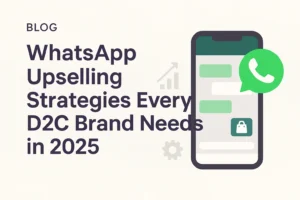
Chatbots with AI capabilities are now an essential component of modern corporations’ digital communication plans. Chatbots are becoming essential in many businesses, whether they are used to answer consumer questions, automate internal procedures, or assist users with product journeys. The AI chatbot creator, however, is a person you hardly ever see behind these intelligent virtual assistants.
Knowing what an AI chatbot developer performs and why your company might need one is more important than ever in 2025, as AI technologies continue to advance quickly. Their work is the cornerstone of a successful chatbot implementation, ranging from creating intelligent conversations to incorporating intricate AI models.
In this blog, we’ll break down the real role of an AI chatbot developer, their key responsibilities, the tools they use, and why businesses are increasingly seeking their expertise.
Who Is an AI Chatbot Developer?
An AI chatbot developer is a professional who specializes in designing, building, and maintaining chatbots that use artificial intelligence to understand and respond to human input. Unlike traditional software developers, chatbot developers work at the intersection of:
- Natural Language Processing (NLP)
- Machine Learning (ML)
- User Experience Design
- Software Engineering
They don’t just write code—they create intelligent conversation systems that feel natural, personalized, and useful to end users.
Core Responsibilities of an AI Chatbot Developer
Here’s what an AI chatbot developer typically does during the end-to-end development process:
1. Understanding Business Goals and Use Cases
Every chatbot serves a purpose—customer support, lead generation, onboarding, internal operations, etc. A chatbot developer collaborates with business stakeholders to:
- Define goals
- Identify user journeys
- Choose the right platforms (web, mobile, WhatsApp, Slack)
2. Designing Conversational Flows
Developers create conversation logic based on how users naturally speak. This includes:
- Creating intents and entities
- Designing user flows
- Handling interruptions, clarifications, and fallback scenarios
3. Implementing NLP and AI Models
AI chatbot developers integrate natural language processing engines to help bots understand and respond in human-like ways. This may involve:
- Training models using user data
- Integrating APIs from GPT, Dialogflow, Rasa, etc.
- Fine-tuning responses for accuracy and relevance
4. Programming the Bot Logic
They use programming languages like Python, JavaScript (Node.js), or Java to implement:
- Backend logic and APIs
- Data storage and retrieval
- Custom integrations (CRM, ERP, databases)
5. Integrating Across Platforms
An AI chatbot developer ensures the chatbot can interact seamlessly with users across channels such as:
- Websites
- Mobile apps
- Messaging platforms (Messenger, WhatsApp, Telegram)
- Voice interfaces (Alexa, Google Assistant)
6. Testing and Optimization
Before launching, chatbot developers rigorously test:
- User intent recognition
- Response accuracy
- Bot flow logic and edge cases
Post-launch, they monitor performance metrics and refine the chatbot using real-world data.
7. Ensuring Data Security and Compliance
Chatbot developers ensure all conversations are secure and compliant with regulations like GDPR, HIPAA, or CCPA—especially when handling sensitive information.
Key Skills and Tools an AI Chatbot Developer Uses
A skilled chatbot developer in 2025 is both technically proficient and AI-savvy. Here’s a snapshot of what they work with:
Languages & Frameworks
- Python
- JavaScript (Node.js)
- Java
- C#
- React (for chatbot UIs)
NLP & AI Platforms
- OpenAI GPT-4/5
- Google Dialogflow
- Rasa (open source)
- Microsoft LUIS
- Amazon Lex
- IBM Watson
Integration & Deployment Tools
- Webhooks
- RESTful APIs
- Firebase
- AWS / Azure / Google Cloud
- Twilio, Slack, WhatsApp APIs
Analytics & Monitoring
- Chatbase
- Dashbot
- Google Analytics
- Custom dashboards (built using BI tools)
Security & Compliance
- OAuth2, JWT
- End-to-end encryption
- Data masking
- GDPR/CCPA/HIPAA frameworks
Why You Need an AI Chatbot Developer in 2025
You might be wondering: Can’t I just use a chatbot builder or a no-code platform?
Sure—if you’re looking for something very basic. But for chatbots that are intelligent, integrated, and adaptable to real business needs, an AI chatbot developer is essential.
Here’s why:
1. You Need More Than Just Predefined Answers
Basic chatbot platforms rely on rigid scripts. A developer helps build bots that learn and evolve, respond in context, and make conversations truly helpful.
2. Your Business Needs Custom Integrations
Want your chatbot to connect with your CRM, ERP, or internal ticketing systems? A chatbot developer can build custom integrations that no plug-and-play tool can offer.
3. You Want a Scalable, Future-Proof Solution
As your business grows, your chatbot must grow too. Developers ensure your solution is:
- Modular
- Scalable
- Easy to update
They also help you pivot to new technologies like voice bots, multimodal bots, or multilingual bots when needed.
4. Security and Compliance Matter
If your chatbot handles personal data (e.g., in finance or healthcare), compliance is critical. Developers implement:
- Secure data protocols
- Consent mechanisms
- User authentication
All of which protect your brand and user trust.
5. You Want a Competitive Advantage
AI chatbot development isn’t just about automation—it’s about personalization, engagement, and differentiation. A custom-built chatbot can:
- Understand user behavior
- Offer targeted offers
- Recommend content or products dynamically
This kind of intelligence gives your business a serious edge.
Industries That Rely on AI Chatbot Developers
Here’s how businesses across industries are benefiting from skilled chatbot developers:
Healthcare
- Virtual triage assistants
- Appointment scheduling bots
- Medication reminders
Retail & E-commerce
- Personal shopping assistants
- Product recommendation bots
- Order tracking and customer service bots
Banking & Finance
- Conversational banking assistants
- Fraud alert bots
- Expense tracking and financial advice
Travel & Hospitality
- Booking and itinerary assistants
- Customer service bots for hotels and airlines
- Multilingual concierge bots
Enterprise & HR
- Onboarding bots
- Internal IT support bots
- Employee self-service systems
Hiring an AI Chatbot Developer: In-House vs. Outsourcing
Depending on your needs and budget, you can either:
Hire In-House
- Ideal for large enterprises
- Better control over development and iteration
- Requires higher investment in time and resources
Work with a Specialized AI Chatbot Development Company
- Faster deployment
- Access to experienced developers and AI specialists
- Scalable and cost-effective
- End-to-end service: from strategy to launch to maintenance
What to Look for in an AI Chatbot Developer
When hiring or partnering, make sure they have:
- Proven experience in chatbot projects
- Solid knowledge of NLP and ML
- Integration capabilities with your tools
- Understanding of your industry-specific needs
- A strong portfolio and positive client testimonials
Final Thoughts
AI chatbots are becoming a fundamental component of how contemporary businesses function and compete, not just a trend. However, it takes the skills of a committed AI chatbot developer to create one that is intelligent, scalable, safe, and customized.
Investing in the appropriate development skills can make the difference between a chatbot that answers questions and one that speeds up growth, regardless of whether you’re starting from scratch or updating your current chatbot.






